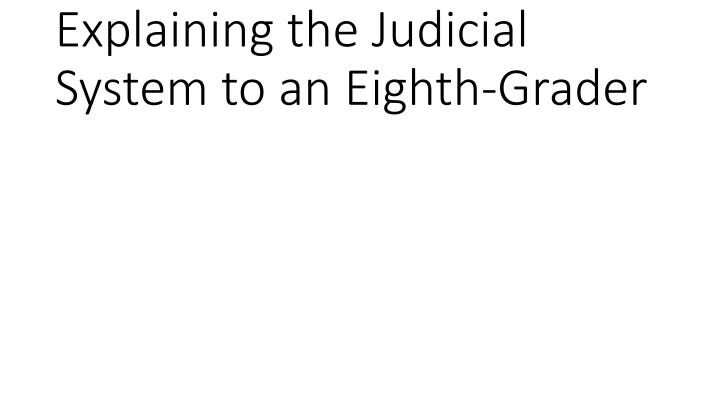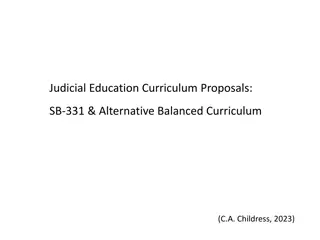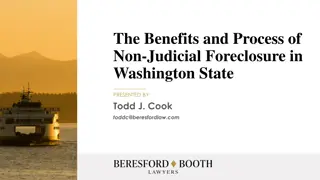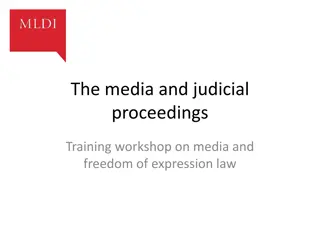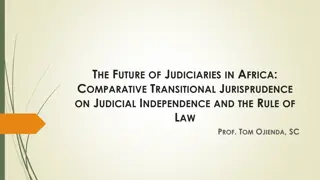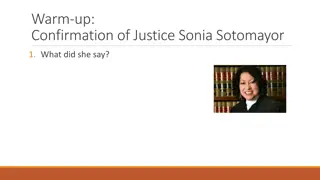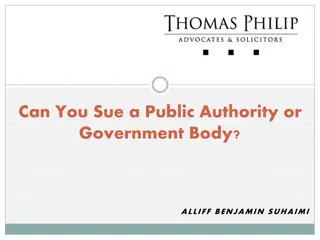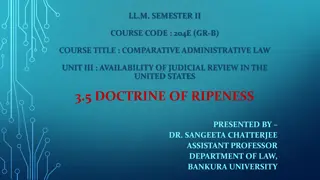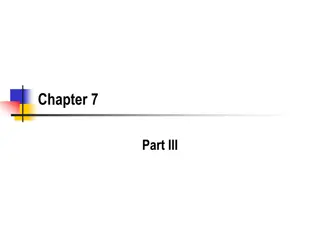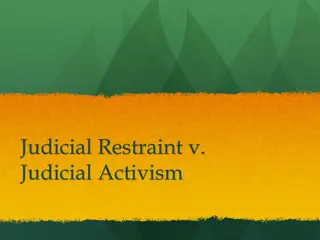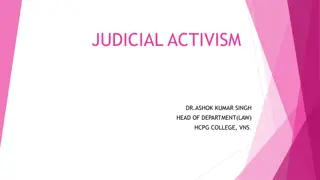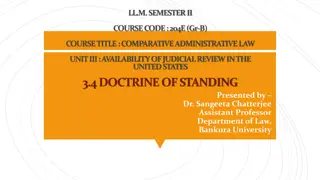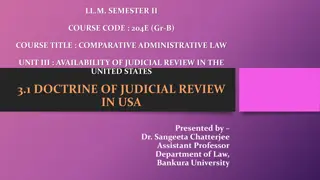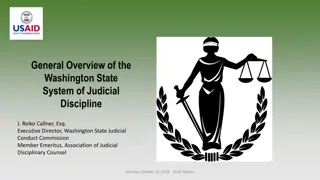The Judicial System in Simple Terms
In the judicial system, laws are created by elected officials to maintain order. City council members, county commissioners, and state legislators pass laws that define different crimes and their punishments, such as misdemeanors and felonies. These laws aim to ensure public safety and justice is served when someone is accused of breaking the law. Each state has its own set of laws, and understanding how they work is crucial for a harmonious society.
Download Presentation

Please find below an Image/Link to download the presentation.
The content on the website is provided AS IS for your information and personal use only. It may not be sold, licensed, or shared on other websites without obtaining consent from the author.If you encounter any issues during the download, it is possible that the publisher has removed the file from their server.
You are allowed to download the files provided on this website for personal or commercial use, subject to the condition that they are used lawfully. All files are the property of their respective owners.
The content on the website is provided AS IS for your information and personal use only. It may not be sold, licensed, or shared on other websites without obtaining consent from the author.
E N D
Presentation Transcript
Explaining the Judicial System to an Eighth-Grader
You Are Arrested When the State Accuses you of Committing a Crime
Examples of Crimes Stealing Murder Theft Drug Dealing Fraud
You Are Arrested When the State Accuses you of Committing a Crime, of Doing Something Wrong, of Breaking a Law. But who makes the laws? Elected officials
These Elected Officials Represent Different Geographical Areas The City The County The State The Country
City Council Members Pass Laws Called Ordinances In Dade City, a naked woman can t appear in a bar. Punishment: Fine up to $500 or Jail Term up to 90 Days. In New Port Richey, you can t have a rooster on your property. Fine up to $500.
County Commissioners Pass County Ordinances Any Person Who Leaves A Dog, Cat or Other Animal Unattended in a Parked Vehicle with Inadequate or No Ventilation. Fine up to $500
State Legislators In Tallahassee Pass Laws. There are Two Types Misdemeanors, punishable by up to a year in jail. Felonies, punishable by a year and a day in prison up to death
Examples of Misdemeanors Disorderly Conduct Criminal Mischief Domestic Violence Reckless Driving DUI Shoplifting Petty Theft
Examples of Felonies Murder Sexual Assault Kidnapping Child Abuse Burglary Robbery Aggravated Assault
Each State Has Different Laws They Are Similar But Not Identical States have Different Laws Regarding: Abortion, Marijuana, Guns and The Death Penalty
Representatives in Washington D.C. Pass Federal Laws Money Laundering Drug Trafficking Tax Fraud Bank Robbery Terrorism
The Civil Arena When there is a dispute or argument where one party believes the other party has caused some kind of harm. Example: A person slips and falls in a Publix after an employee left a greasy piece of wrapper on the floor. Damages may be sought, or one party may just want the other part to stop doing something. Fall victim may want money to pay for medical bills and lost wages. Buttweiser vs. Budweiser
Family Court Divorce The division of assets and liabilities Child custody Child support Alimony
Unified Family Court Delinquency:When someone under the age of 18 is accused of a crime. Dependency: When the parents are providing a less than ideal home for the children. Goal: To rehabilitate the juvenile, to keep the family together. If, however, the parents continue to pose problems, their parental rights can be terminated, and the child put up for adoption.
Therapeutic Courts Adult Drug Court Veterans Court Early Childhood Court Mental Health Court DUI Rehabilitation of Offenders Program (D.R.O.P) Goal: To get these program participants the help they need.
Probate and Guardianship Contested Wills Guardianships: Judge decides whether an incapacitated person needs a guardian
Other Divisions Domestic Violence: When someone is accused of hitting another person in a domestic setting where the maximum punishment is a year in jail. Community Violence: When someone seeks an injunction or restraining order against another person because that person has allegedly done something harmful, such as hit them, stalk them, threaten them. Traffic: Criminal traffic infractions, such as DUI, driving with a suspended license, and leaving the scene of a crash.
Likely The First Person You are Going to See When the State Accuses You of a Crime City police officer Sheriff s deputy Agent with the Florida Department of Law Enforcement Agent with the Federal Bureau of Investigation
Probable Cause Bond (or Bail): The more severe the allegation is, the higher the bond. Can t Make Bond?: First appearance before a judge within 24 hours. Judge decides whether charge is appropriate, bond is reasonable, and makes sure defendant has an attorney.
Probable Cause vs. Guilty Beyond a Reasonable Doubt Prosecutors May Decide Not to Go Ahead. Charge is dropped. If the prosecutor decides to go ahead, the case is disposed of through one of two ways. Plea: Prosecutor and Defense Attorney Agree On a Resolution Trial: If they don t agree, or if the defendant insists on a trial.
Trial? An Impartial and Fair Jury Must be Selected Roles Played In the Courtroom: Judge, Defendant, Defendant s Attorney, Prosecutor, Bailiffs, Witnesses, Court Clerk, Stenographer The jury must consider only the evidence that is presented in court. Outcome: Acquittal or Conviction. Conviction? Sentence. The conviction can be appealed.
